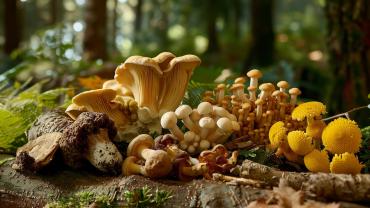Mushrooms are neither plant nor animal, and scientifically belong to the fungal kingdom. Mushrooms occur in a wide variety of forms and are found throughout the world. Out of an astonishing estimated presence of 5 million, only a small percentage have been discovered. From those, only about 2,000 are currently safe for human consumption. And 25 of those are commercially available. Of the 25 most common and commercially available, eight stand out as clinically relevant: reishi (Ganoderma lucidum, G. applanatum, and G. tsugae), chaga (Inonotus obliquus), lion’s mane (Hericium erinaceus), cordyceps (Cordyceps militaris and C. sinensis), maitake (Grifola frondosa), shiitake (Lentinula edodes), agaricus (Agaricus blazei), and turkey tail (Trametes versicolor).
Mushrooms are prized for being nutritionally dense, containing an impressive protein and amino acid profile; fiber; major minerals, including potassium, phosphorus, sulfur, and magnesium; trace minerals, such as copper, iron, and zinc; and several B vitamins (vitamins B1, B2, B3, and B6). In addition to the nutrient profile of edible mushrooms, they also produce different types of bioactive compounds — namely, glucans, ergothioneine, phenolics, and terpenoids. These compounds are associated with many health benefits and may help support overall vitality and healthy aging, including promoting healthy immune balance and cognitive function.
Beta-glucans are fibers found in mushrooms, oats, barley, yeast, and even some types of algae. Preclinical research has shown that beta-glucans can interact with key immune cells, helping to support the body to maintain balanced immune responses. Small clinical studies support that beta-glucans from sources like mushrooms and yeast promote respiratory health and immune health. Furthermore, beta-glucans act as a prebiotic, helping to nourish a diverse microbial ecosystem in the gut.
- Reishi encompasses a group of mushrooms referred to as bracket fungi. It may include Ganoderma lucidum, G. applanatum, and G. tsugae. Recent clinical and preclinical research highlights the potential immune and metabolic health role of G. lucidum across various populations. In healthy adults, people who were given G. lucidum β-glucan (200 mg/day) experienced stronger immune responses compared to those who received placebo. College-aged women who were given reishi experienced improved psychological stress scores, including anxiety, vitality, and well-being.
- Lion’s mane is a type of mushroom that has been studied for its effects on brain health, including on memory and mood. Studies have evaluated both short-term (single dose) and long-term (16-week) intervention with lion’s mane. In one study with older adults who had mild memory problems, those who took lion’s mane every day for 16 weeks scored higher on memory and thinking tests compared to people who took a placebo. In another small study with healthy adults, the participants who were given lion’s mane once showed improved mental performance on a test within an hour.
- Cordyceps is a type of fungus that has been studied for its possible benefits on exercise and immune health. Research suggests it may help people perform better in both endurance and strength-based activities. This may be because cordyceps helps the body use oxygen more efficiently and produce more ATP — the primary source of energy for the body’s cells.
- Maitake, referred to as “hen of the woods,” has been studied for its supportive effects for immune health. In animal and lab studies, maitake has been shown to boost important immune messengers, increase the number of protective immune cells, and activate natural killer (NK) cells that help fight off invaders. It also seems to support the body’s antioxidant defenses and promote a healthy inflammatory response, which may help protect the brain and nerves. Interestingly, when maitake is combined with other mushrooms like shiitake and reishi in lab tests, the mix shows an even stronger effect on immune activity.
- Shiitake mushrooms are known as a symbol of wellness in many cultures, and are packed with compounds that help the body stay strong as it ages, including lentinan, a β-glucan found in shiitake. Research shows that shiitake can support immune health, normal inflammatory responses, and promote the body’s antioxidant status. In one four-week study with healthy adults, eating shiitake mushrooms daily (about 5–10 grams) improved the activity of special immune cells, increased protective antibodies, and lowered markers of inflammation.
- Chaga contains bioactive sugars and other compounds with immune-supportive properties.
- Agaricus mushrooms (Agaricus blazei ) have been preclinically shown to help support immune health by activating macrophages and NK cells, which help an organism fight off harmful invaders.
- Turkey tail mushrooms have been shown in in vitro and animal studies to display immune-modulating activity and help promote antioxidant status.
Although larger clinical trials are needed to investigate the effects of edible mushrooms on various populations, mushrooms are a nutrient-rich way to help support overall health. They contain numerous active compounds that work synergistically to support immune, brain, and musculoskeletal health. As research continues to grow, mushrooms stand out as both a nourishing food and a promising area of study for promoting healthy aging and overall vitality.
To learn more about mushrooms and health:
The Immune Supportive Properties of Mushrooms
Supporting Health with Shiitake Mushrooms
Immunomodulation with Beta-Glucans
Recent Review Explores Health-Supportive Properties of Ganoderma Lucidum Extracts
By Bri Mesenbring, MS, CNS, LDN, and Danielle C. Male, MS, CNS, LDN
